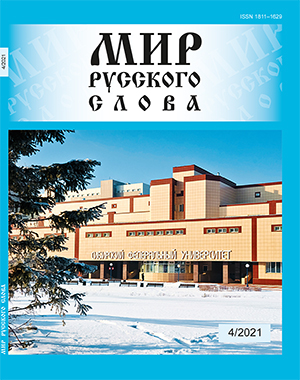Typological Study of Predicate of State Based on their Semantic Features
DOI:
https://doi.org/10.24412/1811-1629-2021-4-14-21Abstract
The article is devoted to a controversial problem: the typology of predicates of state in the Russian language. The relevance of this work lies in the fact that it examines the criteria allowing to build a semantic classification of such predicates, based on their syntactic analysis. Therefore, the purpose of the article is to specify the taxonomic types of predicates against the background of the meaning of the actualized semantic features inherent in these language units. In terms of the methodological basis of the study, the author relies on the hypothesis about the allocation of semantic features offered by Olga Seliverstova and Tatiana Bulygina, as well as Dan Davidson’s ideas, allowing to distinguish predicates of state from other predicates. The research material is the texts with predicates of state extracted from the National Corpus of the Russian Language and Twitter. The studies and material taken into account by the authors prove that in modern Russian linguistics there has been a tendency to study the essence of predicates in a typological aspect. The novelty of the article lies in the use of the speech act model for describing predicates, taking into account the fact that predicates of state are determined by such semantic features as non-agentivity, phase, static character and quantifiability, limited by temporal-spatial localization. Within this approach, the article concludes that the general grammatical meaning of the predicates of state is associated with the expression of a state in its broadest sense (the state of a person, animal, nature and environment, modal assessment of the subject’s state), denoting non-dynamism.
Keywords:
typological study, predicates of state, semantic features, dynamism and static character, syntactic typology, model of a speech act
Downloads
References
References
Downloads
Published
How to Cite
Issue
Section
License
Articles of "The World of Russian Word" are open access distributed under the terms of the License Agreement with Saint Petersburg State University, which permits to the authors unrestricted distribution and self-archiving free of charge.




